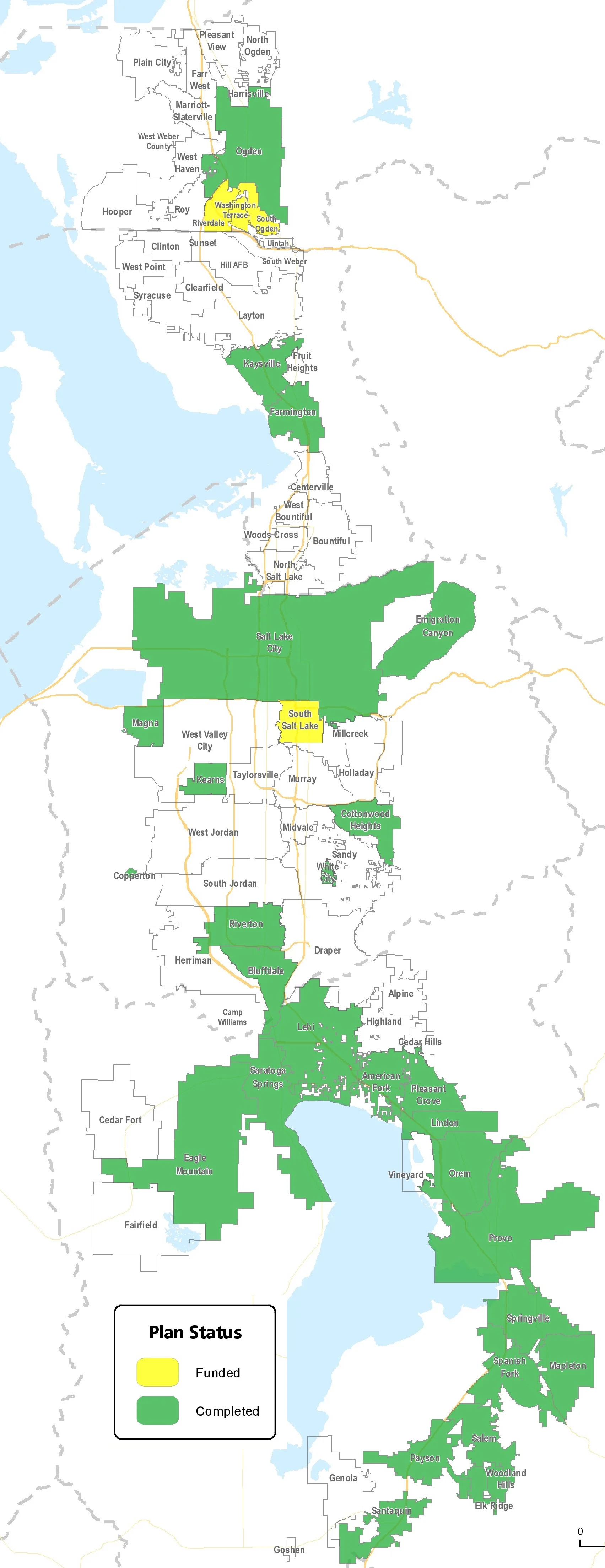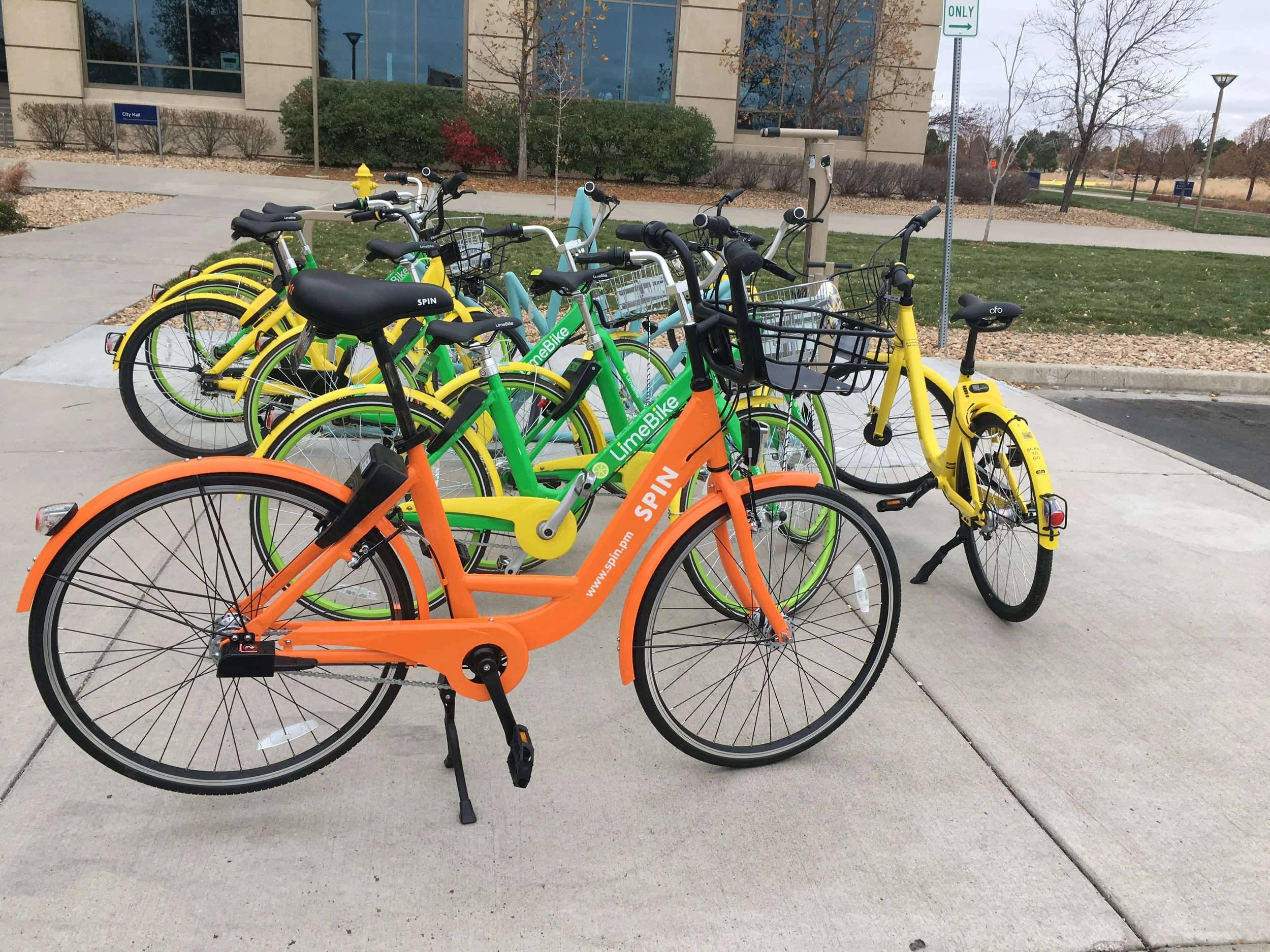The City of Surprise, Arizona is currently in the public hearing/adoption process for its first ever Arts & Cultural Master Plan, implementing a policy outlined in the Arts & Culture Element of the Surprise General Plan 2035. by Joshua Mike, Planner II - Long Range, City of Surprise, AZ
Read MoreWhen the new Fellows of the American Institute of Certified Planners gathered for their induction ceremony at the APA National Conference in New Orleans, New Mexico, the Western Planner was well represented. For anyone who knows Dan Pava, FAICP, and/or Jim Strozier, FAICP, it is no surprise that both have achieved this distinguished milestone representing a feather in the cap of their long and illustrious planning careers. by John M. Valdez, AICP, and Brad Stebleton
Read MoreIn a healthy 10-minute neighborhood most trips – to school, shops, services, work, recreation, and public transit - can be made by foot or bike within 10 minutes. To improve physical health we know we must transform our cities into a networked system of 10-minute neighborhoods. by Dr. Suzanne H. Crowhurst Lennard
Read MoreLand use decisions surrounding airports in growing or soon-to-grow rural communities will be critical to protecting their long-term economic and transportation related health. Utah's communities have experienced many of the challenges that accompany land use decisions around airports. The following is some advice and techniques gathered and compiled in the guide: Airports & Land Use, An Introduction for Local Leaders. by Kyle Slaughter and Paul Moberly, Salt Lake City, Utah
Read MoreLast June, the City of Pullman, Washington, approved a new downtown development complex intended for retail businesses as well as student housing. It will be the largest mixed-use residential development in Pullman’s downtown. by Jason Radtke, Pullman, Washington
Read MoreWYOPASS's spring conference will be held in Riverton on May 10 & 11.
Read MoreRenewable energy is the future. In King Cove, local leaders decided the future is now and invested in renewable energy projects. The debt the city has taken on is a heavy yoke to bear, even with its electric utility fund being financially sound. Yet, the dream has been realized. Today the small city (pop. 900) boasts being one of the few communities that enjoys 75 percent of its electricity from a renewable source. Its projects have been recognized by the International Energy Agency’s Hydropower Group and that were included in their Good Practices report. by Gary Hennigh, King Cove, Alaska
Read MoreCreating more walkable, bikeable communities has all sorts of other benefits too. Getting more people walking and cycling is good for the economy, reduces vehicular emissions, and facilitates social interaction among residents. This past October, residents of Raton, New Mexico met with other stakeholders to conduct a walkability workshop. by Jeff DeBellis, Albuquerque, New Mexico
Read MoreDan Pava, FAICP, discusses how the annual Rocky Mountain Land Use Institute explored disruption and how we can plan for an uncertain future full of unknown changes to business practices, new technologies, and disasters. As planners, it is daunting to challenge to plan for the unknown, and yet that’s exactly what we do every day.
Read MoreThis was Angela Parker's first year attending the Rocky Mountain Land Use Institute (RMLUI) in Denver, Colorado. Here is an overview of her top three sessions. by Angela Parker, AICP, CFM, Fairbanks North Star Borough Community Planning, Alaska
Read MoreA functional bicycle and pedestrian network is only as good as its weakest link. The Wasatch Front metropolitan area holds 85 percent of the state’s population within a thin stretch of land 100 miles long between the Wasatch Mountains and the Great Salt Lake. Multiple jurisdictions, a large population, and a desire for consistent bicycle planning led to the need for a broad-based effort to engage cities regarding how they can make their communities better for bicycling and walking. by Scott Hess, Active Transportation Planner, Wasatch Front Regional Council
Read MoreLas Cruces, NM took an innovative approach for its 2016 Downtown Master Plan, which directly connects to the City’s Comprehensive Plan.The plan integrates the adjoining historic neighborhoods to weave together common central city goals, as well as economic and market analyses throughout the goals and strategies. Not to mention, the plan’s magazine-like layout dramatically improves reader engagement and readability. by Andrew Hume, AICP, MPA, Las Cruces, New Mexico
Read MoreAs the Yankton County Planning & Zoning director, Pat Garrity has overseen the completion of the Dakota Plains grain terminal at Napa Junction, a big year for building permits and the contentious issue of CAFOs that promises to spill into the new year. And beyond county government, Garrity has dedicated himself to a much bigger cause — raising awareness of and prevention of suicide. It’s because of these many efforts that the Press & Dakotan has named Patrick Garrity its Newsmaker of the Year for 2017. by Rob Nielsen
Read MoreAs part of the North Denver Cornerstone Collaborative effort, the City and County of Denver created the Mobility Master Plan in March 2016 that was led by HDR, Inc. The plan included developing layered multimodal transportation networks within these complex and historic neighborhoods to make travel easier and more convenient for people walking, biking, and taking transit. by Drew Parker
Read MoreAccessory dwelling units (ADU) are poised to present the most viable stepping-stone solution for cities that are experiencing a housing crisis and exploring how to increase housing opportunities within their single-family residential zones. Author Kol Peterson, an ADU expert based in Portland, Oregon, recently released the book Backdoor Revolution-The Definitive Guide to ADU Development as a guide for planners, ADU advocates, and homeowners who aspire to build ADUs.
Read MoreSpearfish, South Dakota spent the last year discussing options for the renovation of a key street, Jackson Boulevard, beginning with an expansive (and expensive) new vision for the street, and ending up with something significantly different. by Jayna Watson, AICP, RLA
Read MoreThe American Planning Association Alaska Chapter presented several awards at its conference in November 2017. Congratulations to the winners!
Read MoreDue to the lack of paid planners and a state-sponsored Main Street program in Utah, many communities are left without the necessary resources to address struggling, unattractive main streets—many don’t know where to start. The State of Utah’s Community Development Office (CDO) saw a need for a simple, quality resource for citizen planners to use so that they can confidently assess their local main streets and identify needed improvements, then move towards positive change. They created the award-winning Main Street Sandwich Method for rural citizen planners to help assess a community’s main street. by Paul Moberly, AICP, Utah
Read MorePlanning drift -- that unpleasant indication that a plan’s goals have separated from its reality – can be attenuated with implementation-stage monitoring and evaluation. Yet planners often omit such mechanisms because of organizational resource limitations and aversion to criticism. This Alaska case study explores how planners more easily can incorporate citizen-based monitoring and evaluation into the implementation stage of an adopted comprehensive plan. by Carla Burkhead, Anchorage, Alaska
Read MoreWithout a bike-sharing system already in place, the city of Aurora set out to create a Bike Share Permit Program that would reduce travel time and congestion, provide multi-modal mobility to a wide range of users, and increase transportation access and options in Aurora. Realizing the potential that bike sharing can provide for short-distance, point-to-point trips, including last-mile connections to public transit, the city of Aurora launched the first dockless bike-sharing permit program in Colorado in early October 2017. by Brenden Paradies
Read More



















